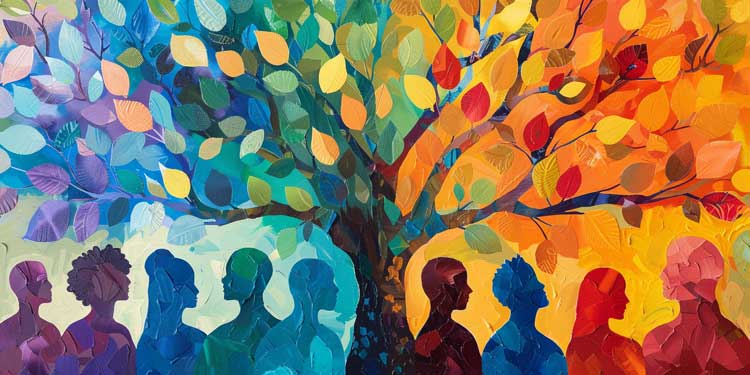The experiences of Black and People of Colour (BPOC) and trans and nonbinary (TNB) people in mindfulness spaces in the UK
Welcome to Autumn and an update on my doctoral research. As we celebrate Black History Month (BHM) through honouring and raising the experiences and voices of BPOC, we are faced with the challenge of navigating the legacies and new iterations of colonialism and intolerance. As ever, we need our practice and approach of mindfulness, compassion and social justice to resource ourselves; to bring awareness, resilience and strength to face and take action in whatever way we can to dismantle and repair such harm. This can also be seen as a decolonial practice[1]; the process of looking within ourselves and communities to acknowledge the reality and impact of colonialism and other forms of oppression such as transphobia. We become increasingly aware of how this plays out through individual (conscious or otherwise) and systemic discrimination and disparities in access to services, employment, wellbeing and health[2]. It may feel uncomfortable for us to accept how this plays out in mindfulness spaces; classes, curricula, teachings, teacher training and research, and ways forward are scarce to date, hence my doctoral work.
The early results from my survey and interviews are striking and fascinating in how being BPOC and TNB play out in mindfulness classes and courses. Most respondents spoke of feeling uncomfortable, reporting a lack of diversity and awareness about race and TNBI inclusion. TNBI people also experienced misgendering. There were interesting differences in that race is often more visible whilst gender can be unseen and TNB people misidentified. Many trans people did not attend in-person classes because of the wider hostile climate and fear of negative experiences a class.
And as a BPOC who is also nonbinary, these fascinating insights are inspiring some of my new autoethnographic pieces which are my personal reflections that link the research with my own experiences and visions of a more inclusive space.
The point of this project is of course to make improvements so we can all continue to take action in ways that participants and research suggest are needed. So, I have been compiling recommendations based on previous research, and my participants’ contributions whose voices have seldom been heard. And there are so many easy wins that mindfulness practitioners, providers and attendees can do to increase access and diversity for BPOC and TNB people. Good starting points are accepting there are issues, learning about and addressing cultural appropriation, race and trans inclusion, sharing pronouns and not assuming someone’s gender or ethnicity from their name or presentation, bursaries to train tutors from these communities, affordable classes and courses, taking mindfulness into communities’ spaces, inclusive group agreements, being trauma-informed and so on.
We like to think that we are “open to all” but in the current climate this is increasingly not how it feels for many BPOC and TNB people.
I will share more in the coming months. And as we turn inward and reflect with the changing seasons, I wish us all the peace and resilience.
Josetta (they/them)
Doctoral Researcher at University of Aberdeen
PhD on “Race and Trans and Nonbinary Inclusion in Mindfulness”
Email: j.malcolm.22@abdn.ac.uk
Fees funded with gratitude by The Everyone Project’s Chloe Holmwood Bursary.
[1] Chawla, D. and Atay, A. (2018). Introduction: Decolonizing Autoethnography. Cultural StudiesCritical Methodologies, 18(1), pp.3-8.
[2] Shafi, A. and Nagdee, I (2022). Race to the Bottom: Reclaiming Antiracism. London: Pluto Press.


